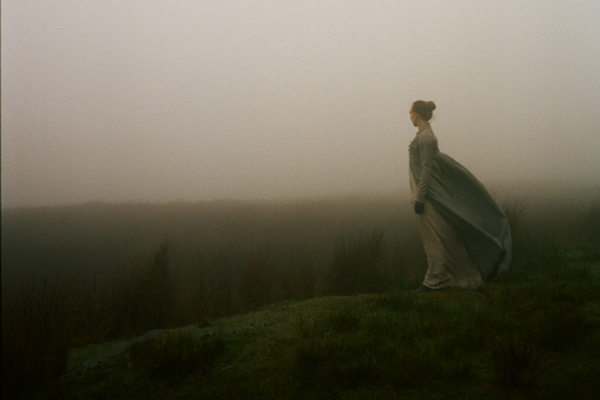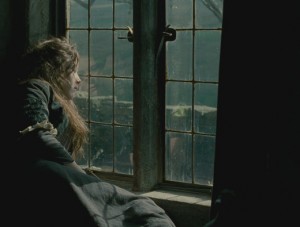
According to Alex Cox’s Sid and Nancy, the British aren’t really into sex—but Andrea Arnold’s Wuthering Heights made me believe (for about 90 minutes) they invented longing. I suppose since the film’s based on a literary classic often taught in high school, critics haven’t been quick to call the hyper-arty prestige piece a bodice ripper, but I’m not above that. Arnold’s vision of Emily BrontÁ«’s book is as much about social liberation as sexual, while remaining as chaste as such an exploration could be. You’ll be hard pressed to find a story about tween desire more pained and raw, volatile or soaked with craving.
Twilight came from something and before there were vampires there were social outcasts. Here we have Heathcliff: a waif one farmer’s family rescues from the rain. Heathcliff is stoic and silent, built on the instincts to protect and defend we’ve since come to associate with romantic heroes. His ”adoptive” sister Catherine is nearing adolescence, and the age when it’s no longer OK for her to spend hours roaming their land and ignoring her training for wifehood.
Their bond is instant. The couple barely talks. When Heathcliff is whipped, Catherine licks his wounds with a loyalty and a squalor so base, the spectacle overwhelms. If this isn’t sexy, I don’t know what is. Funny enough, Arnold didn’t precisely share my view—she says she was aiming for ”visceral.” Apologies for taking her stimulus in unexpected directions. I won’t be the last to do so.
I thought about two films when I saw this: Tom Jones because I was surprised by how much sex the sexless Brits were having, and Baz Luhrmann’s Moulin Rouge, because it was decoding the period’s culture by way of a selfconsciou period piece. Both are doing something to reveal a vision of their era. What do you feel you’re revealing here?
What I tried to do was be faithful to the book’s essence, which is brutal, troubling and visceral. I read that Emily didn’t mean for anyone to read the book. I think that’s interesting. She wrote it not thinking anyone would read it—this is what someone told me. I heard that and thought it made a lot of sense. She does let it rip in a way that’s unhinged and unconscious.
On some level, I think we’re not supposed to have very many opinions about it — and this book is like the inner workings of someone’s mind, and that’s why people are fascinated with it. It’s really dark and revealing material, and I think that’s why women get fascinated. It’s very feminine, quiet, revealing, fundamental stuff. I tried to be truthful to that.
Why feminine?
I think because BrontÁ« was writing in this unconscious way, she revealed something honest. She’s being—it’s so hard to describe. So much I could say, but none of it succinct. I think Emily, when she’s writing about those people, she’s everyone (Catherine, Heathcliff, Edgar) and Edgar’s her id, Heathcliff is her Super Id and Catherine is her Ego. That may sound mad, but I wonder about it. Heathcliff is as much Emily as anyone.
When I first started writing, I thought it would be contemporary: see Heathcliff in a car with a hoodie trying to get on the straight and narrow. And then I realized the book included a lot of fundamental things about being a woman. Things I found fascinating, but can’t be contemporary because things were different for women at that point [in history]; they weren’t supposed to have voices and were married off at puberty to have babies and die after childbirth. Cathy and Emily go running around the cemetery fancy free, then they’re married off young and their freedom is lost. In the book, a fear of losing independence is attached to puberty—there are all these allusions to birds and feathers.
There s a scene where Heathcliff is beaten—reminder, Heathcliff is Emily’s id—and Edgar (Emily’s super ego the practical side) visits him, and Henry rips off the goose’s wing as he sits down for dinner. He’s ripping the wing off a bird at the moment Cathy is about to start her courtship with Edgar and lose her independence. He rips the wing off the bird—that said quite a lot to me about being female at the time. Scenes of baby Hareton rolling on the ground with feathers on his hands.

Loads of men read the book and don’t like it and wonder if they can sense the huge feminine complaint about being not free or having a say.
Why is it so sexy?
That’s so interesting I don’t think of it that way at all and I’m almost surprised to hear you say that.
Are you joking?
No, I’m trying to figure out how you read that because I’m almost not conscious of it. No one’s said ”sexy” yet.
Did they use softer words? Sensual, maybe?
People have said that, definitely, but sexy, no. I have to tell you that’s not a word I had in my head when I was making it. Visceral—that’s the word I used a lot, communicating with all the people I was working with. In a way I think my film is anti-romantic. You don’t think it’s romantic, do you? Not dirty—romantic? No. Maybe? I suppose it makes a difference what ”sexy” means to you.
How can I be the only one? The passion and the squalor are so palpable. Heathcliff pins Catherine down in a valley!
Oh, I love it sometimes when people describe to me how they see the film and I think ”God that’s clever,” because I didn’t have those intentions — and I’m not clever.






Comments